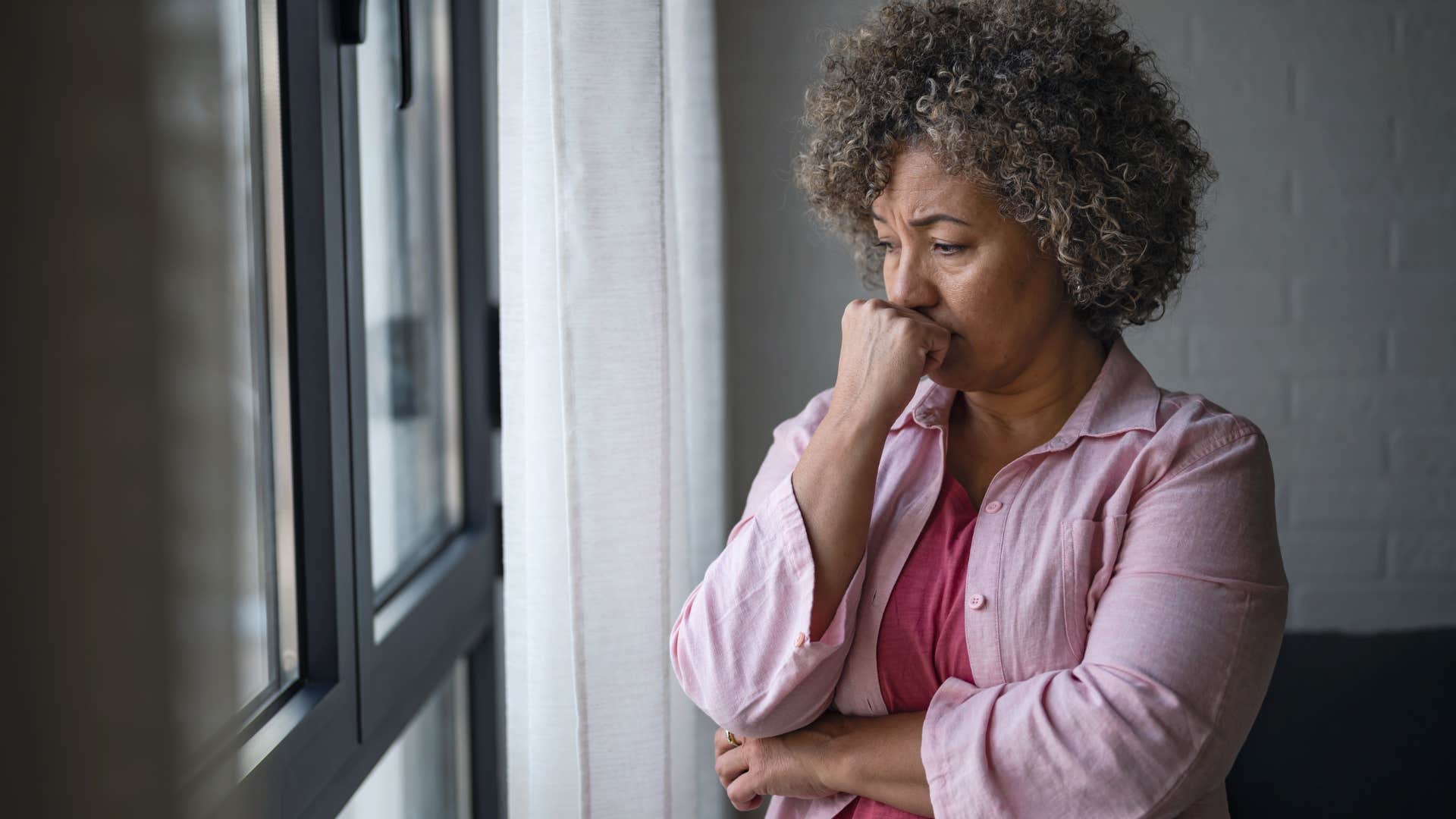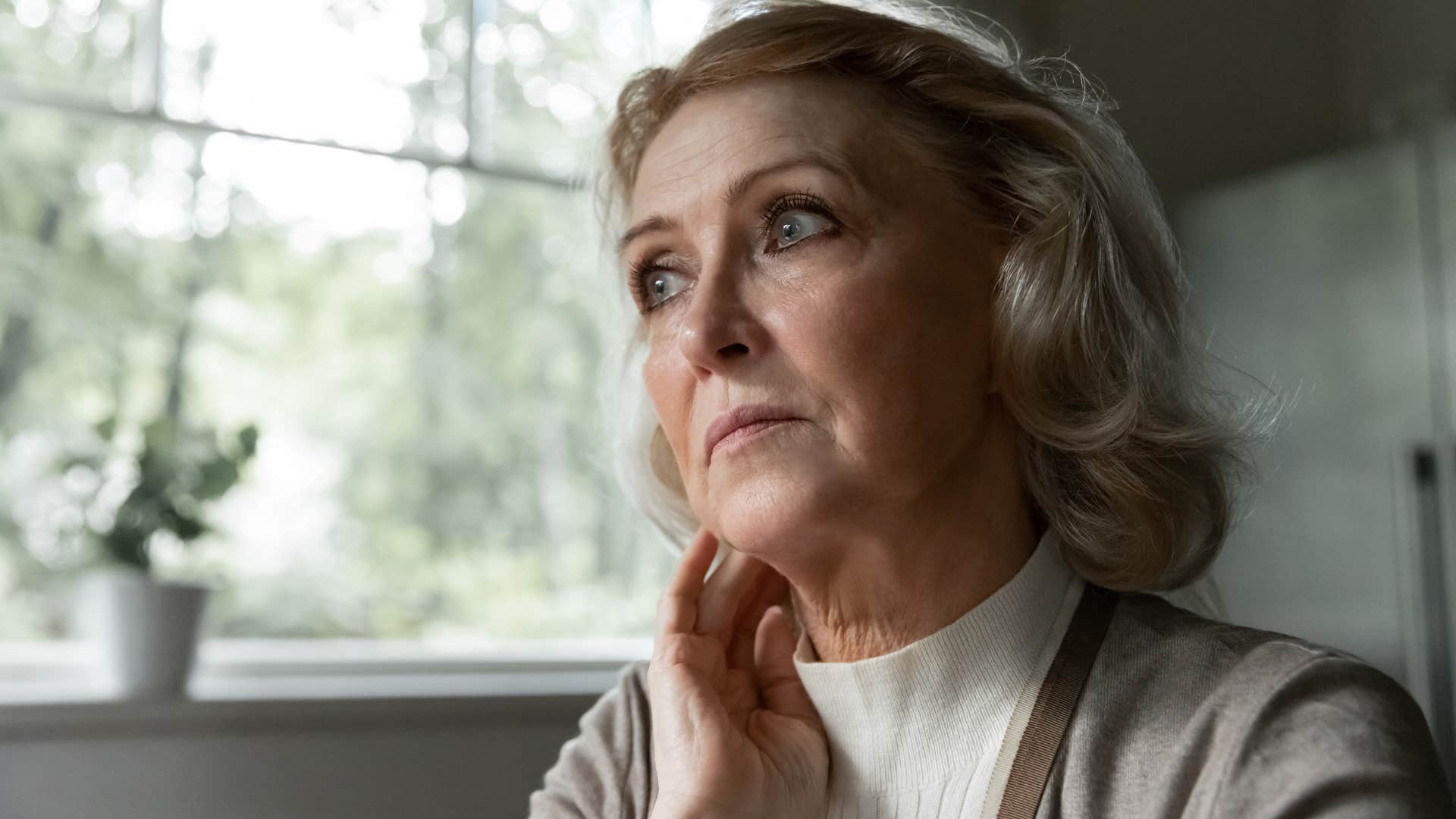Parents Who Get Walked All Over By Their Adult Kids Usually Have These 10 Traits
Healthy boundaries are just as essential in parental relationships as romantic ones.
 fizkes | Shutterstock
fizkes | Shutterstock Cultivating healthy parent-child relationships into adulthood can be complex, complicated, and taxing for everyone involved, especially as people's lives change, their priorities shift, and family dynamics evolve. However, parents who get walked all over by their adult kids tend to overstate the grace their kids deserve, putting their own emotional and physical needs on hold for the sake of familial peace.
Dealing with their own internal struggles, they overlook the harmful nature of their relationships, investing time and energy into their kids that only sparks a cycle of resentment, mistrust, and ignorance.
Here are 10 traits of parents who get walked all over by their adult kids
1. They're lonely
 Fizkes | Shutterstock.com
Fizkes | Shutterstock.com
It's in our human nature to seek connection and to yearn for healthy, fulfilling, and secure relationships. Even when we're aware of the toxicity of an adult child or partner, we're willing to give them grace in the name of combating loneliness and trying to protect the sanctity of a relationship.
According to a study from the European Journal of Ageing, parents who have non-supportive or selfish adult children experience higher rates of loneliness than their peers with healthier family dynamics. Especially if they're made to feel guilty or shamed by their kids, the people-pleasing tendencies continue, sparking a toxic cycle of validation-seeking behavior and mistrust.
Being in a toxic relationship, especially one within your family, can feel more isolating than bonding.
2. They struggle with setting boundaries
 Lordn | Shutterstock.com
Lordn | Shutterstock.com
While experiences from childhood and general family dynamics may seem like a "religion" impossible to question or change, at least according to family therapist Merle Yost, there are ways to promote a healthier dynamic that not only make life easier for everyone, but removes the unnecessary stress and anxiety from a parent child relationship.
Setting boundaries is a relatively vague process, despite being widely labeled as important in self-help circles, which can make the act of actually protecting personal space or emotional well-being difficult for parents — they don't know where to start. While empathetic responses and leading with compassion are important, the most essential part of mastering healthy boundaries is knowing yourself.
What do you need? What makes you uncomfortable? What is entirely in your power and what can you never control? When do you feel most like yourself? By asking yourself these questions, you can clearly define what boundaries look like for you — not to control other people's behavior, but to set expectations for what you'll tolerate in your space.
3. They utilize passive aggression rather than assertiveness
 Fizkes | Shutterstock.com
Fizkes | Shutterstock.com
Many people who struggle to advocate for themselves fear conflict or the discomfort of openly speaking about what they need, whether it's an internal struggle or they're anxious about another person's response. By utilizing passive aggression, they can control the other person's response, while still letting out a bit of their frustration without direct confrontation.
However, passive-aggressive behavior only builds resentment in relationships, especially if one party isn't adamant about setting healthy boundaries that enforce a clear separation of space and energy. Passive behavior, according to a study from the International Journal of Women's Dermatology, is almost always perceived to be "weak" or ineffective by others, reinforcing an adult child's willingness and ability to walk all over their parents.
4. They people-please
 Chokniti Studio | Shutterstock.com
Chokniti Studio | Shutterstock.com
While childhood trauma is often discussed from the perspective of an adult child, many parents struggle with their own unresolved trauma, informing the way they parent their kids into adulthood. When they're being taken advantage of, whether financially or emotionally, by their kids, it's often because they've fallen into the trap of people-pleasing behavior.
Coping with their own trauma by trying to protect themselves from conflict, these parents tend to go out of their way to protect the happiness and comfort of their adult children, even at their own expense. This toxic cycle of not having their needs met, being walked all over by their adult kids, and failing to set appropriate boundaries only drives resentment in parents, eventually cultivating a genuinely unhealthy emotional foundation for them to build a healthy relationship on.
5. They're insecure
 Hryshchyshen Serhii | Shutterstock.com
Hryshchyshen Serhii | Shutterstock.com
While many emotional conflicts and toxic behaviors stem from insecurity, parents who let their adult children walk all over them have a complex and complicated relationship with their self-esteem. Their child's happiness might be ingrained in their happiness, but they're also struggling with confidence as a result of not standing up for themselves or putting their own needs on hold for others.
Even if they can acknowledge that their adult child is toxic to their emotional and physical health, like relationship coach Lisa Lieberman-Wang argues, these parents still struggle with self-esteem issues, because they can't make decisions or set boundaries that act in their best interest.
6. They don't prioritize self-compassion
 Inside Creative House | Shutterstock.com
Inside Creative House | Shutterstock.com
While self-esteem and self-compassion are inherently intertwined, parents who get walked all over by their adult kids usually have issues with showing themselves general kindness, grace, and empathy as they navigate their daily life. According to research from the Social and Personality Psychology Compass, this ability to practice self-compassion on a daily basis is actually more influential on our mental health than self-esteem.
With people-pleasing tendencies, these parents are more concerned with external validation and recognition than self-compassion, relying on other people, specifically their kids, to validate their emotions and empathize with their difficult feelings. In many cases, they're not able to reaffirm their parents, and it restarts the constant cycle of pursuing and being disappointed by every interaction.
7. They seek external validation
 Fizkes | Shutterstock.com
Fizkes | Shutterstock.com
Mindset coach Helen Lee Moon argues that all humans are hardwired to avoid rejection in their relationships, whether it's with a romantic partner, a parent, or an adult child. For many parents who have received most of their validation from their relationship with their children, learning how to develop a healthy relationship with themselves, founded on internal validation and emotional intelligence, feels impossible.
When there's not a mutual balance of gratitude and validation between parents and their adult children, resentment grows underneath the surface, contributing to the shame and guilt that fuels a parent's people-pleasing tendencies with their kids.
8. They have unresolved childhood trauma
 Face Stock | Shutterstock.com
Face Stock | Shutterstock.com
According to research from Blue Moon Senior Counseling, older people are at a higher risk for PTSD symptoms as they age, often induced by unresolved childhood trauma that they didn't have the accessible resources or knowledge to heal from earlier in their lives.
Especially in contrast with adult children who have hyper-analyzed their childhoods or been privy to more helpful therapy tools and information about mental health, these parents tend to push their own struggles and emotions to the side in response to shame about their own parenting styles and experiences.
For adults who already struggle with anxiety or depression, developing emotional intelligence and effective communication styles in adulthood can be difficult, further isolating them from a healthy relationship with their children and the ability to advocate for their own personal boundaries.
9. They're extremely generous
 Fizkes | Shutterstock.com
Fizkes | Shutterstock.com
While parents who are walked all over by their children largely struggle with emotional turmoil and weak boundaries, there's more subtle and unsuspecting traits that can contribute to a toxic dynamic, like generosity.
When they're willing to do things for others, provide grace and make excuses for the children they love, and help out whenever possible, they can unknowingly craft a dynamic where their own needs are constantly unmet. Generosity isn't an inherently bad trait; in fact, it's present in many healthy relationships. But knowing when to step back, prioritize yourself, and create boundaries is important, especially for kind-hearted and compassionate people.
10. They trust others too easily
 People Images Yuri A | Shutterstock.com
People Images Yuri A | Shutterstock.com
Being overly trusting of people can help adults to craft easy connections and make new friends without struggle, but it can also contribute to anxiety, feelings of guilt, and toxic dynamics in relationships with the potential to be incredibly fulfilling.
When parents make excuses for their adult children, they're only revealing the kind of behavior they're willing to accept in their lives at the expense of their own well-being. They may feel more inclined to ignore toxic behavior, feel guilt when they doubt their kids, or make decisions that are counterproductive to their own needs.
It's important, necessary even, according to research from the book "Social Psychology: Foundations of Interpersonal Trust," to have trust in a healthy relationship, but when it's one-sided or rewarded prematurely, it's only sparking a cycle where a parent is taken advantage of without recognition.
Zayda Slabbekoorn is a news and entertainment writer at YourTango who focuses on health and wellness, social policy, and human interest stories.

